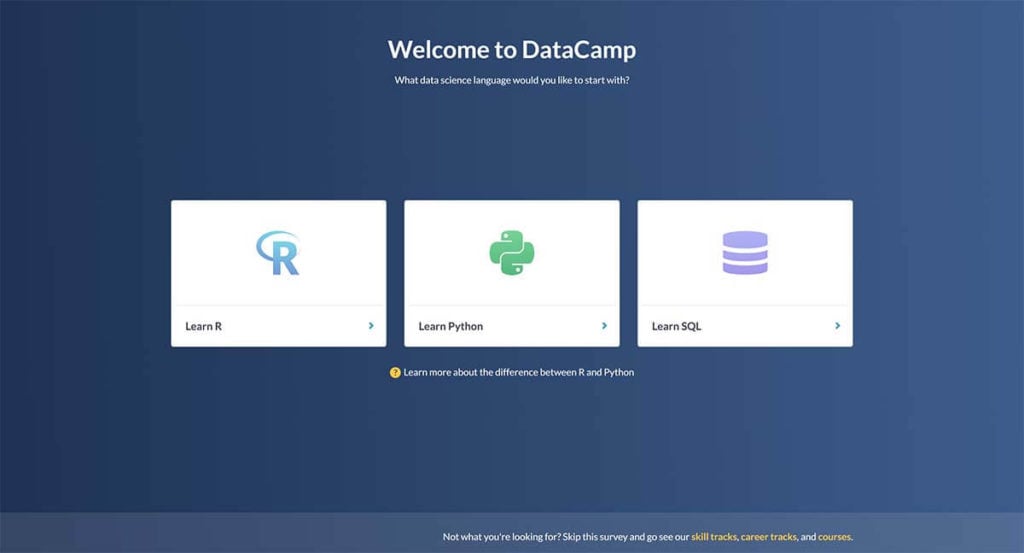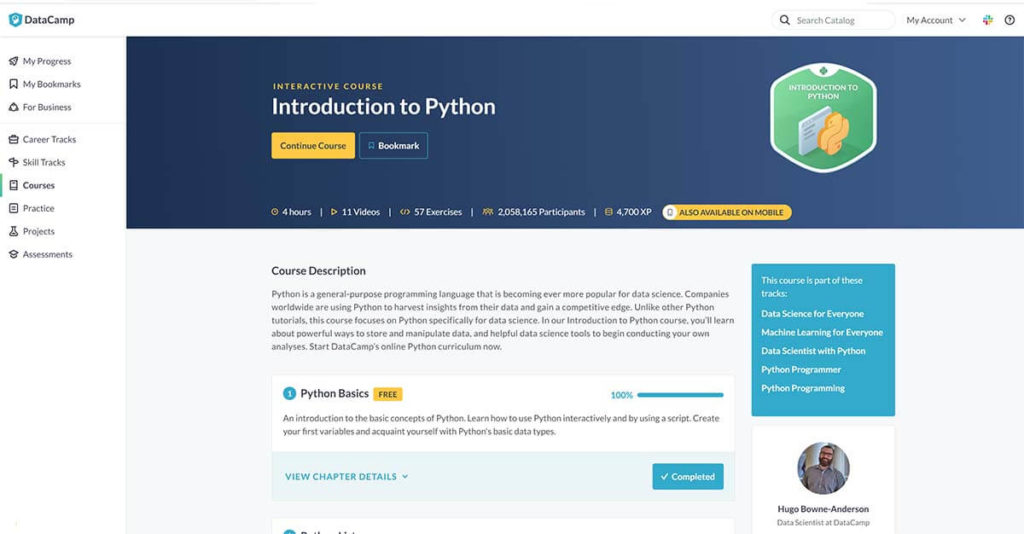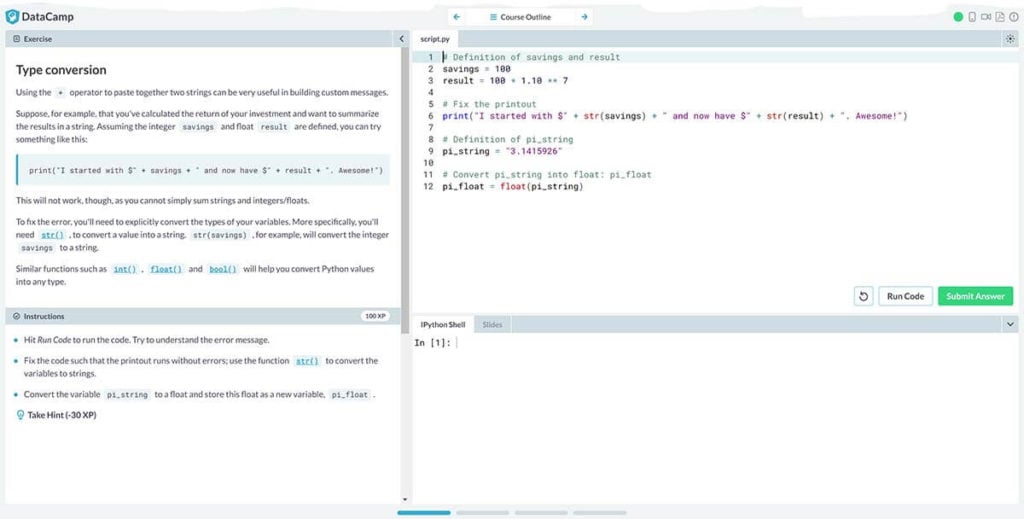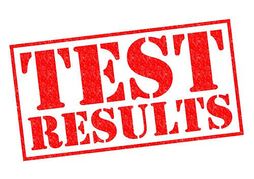DataCamp Review
DataCamp proved to be an excellent platform for learning data science and analytics online. With plenty of high-quality online courses in Python, SQL, and R, DataCamp offers a comprehensive data science training package for individuals and businesses.Visit DataCamp
PROS
- A large variety of courses to choose from
- Covers all major data science languages
- Lots of practical projects to choose from
- Lots of expert instructors
- Excellent web-based code editor
- Content is very beginner-friendly
- Course lessons can be taken offline
- DataCamp app for mobile learning
CONS
- Poor selection of courses for free users
- Experts might find courses unchallenging
- Too much of the code comes prewritten
The global market size for big data is expected to grow from $49 billion in 2019 to $103 billion by 2027. This type of immense growth ensures that data scientists and analysts will be some of the most sought-after experts in the years to come. There are many ways to learn data science, but today I will be evaluating one very specific platform for doing so: DataCamp.
DataCamp is the data science learning platform of choice for major corporations such as Ikea, Deloitte, Intel, PayPal, and Electronic Arts. Noticing that, I knew I had to give the platform a try. I wanted to see why it’s becoming a market leader in data science training at such an astonishing pace.

Are DataCamp courses enough to start a lucrative career in the booming big data industry? Let’s find that out in this review of DataCamp, where I will assess the popular data science online learning platform to see whether it lives up to the hype.
What is DataCamp?
DataCamp is a data science online learning platform founded in 2014 by Belgian data scientists Jonathan Cornelissen, Martijn Theuwissen and Dieter De Mesmaeker. DataCamp offers online courses that use a web-based code editor for hands-on coding training. R, Python, and SQL courses make up the majority of DataCamp’s courses.
Who owns DataCamp?
DataCamp Inc. is a privately held company that is currently managed by CEO Martijn Theuwissen. Martijn is one of the three co-founders of the company since its inception in 2014, together with Jonathan Cornelissen and Dieter De Mesmaeker.
What is DataCamp Limited?
DataCamp Inc., the data science learning platform covered in this review, should not be confused with DataCamp Limited, as they are two entirely different companies. DataCamp Limited is a London-based internet technology company that offers dedicated servers, a content delivery network called CDN77, and network monitoring tools.
What is DataCamp XP?
DataCamp XP is a symbolic point-system that rewards DataCamp students for engaging in online lessons. XP is awarded to students for progressing in courses, exercises, and projects. DataCamp XP cannot be traded for paid DataCamp content.
Is DataCamp recognised?
While those familiar with DataCamp recognise it for what it’s worth, most data scientists are still unfamiliar with the platform. Therefore, as DataCamp is not a university-backed and fully accredited platform, it is not considered recognised in the traditional sense.
How does DataCamp Work?
DataCamp works by offering hands-on coding courses to companies and individual students on its online learning platform. Learners on DataCamp practice skills in data-related topics, to build and maintain data fluency. DataCamp primarily teaches programming with the R, Python and SQL programming languages.
Here’s how to use DataCamp as a beginner in six simple steps:
- Fill out an introductory survey
- Choose a programming language
- Take a skill assessment
- Start your first DataCamp course
- Pass the course syllabus
- Complete other courses, tracks, projects
Fill out an introductory survey
When you start using DataCamp for the first time, you are given an introductory survey that is designed to determine your initial preferences. As you might know already, DataCamp mostly offers courses in three programming languages: Python, R, and SQL.
Choose a programming language

You should decide: do you want to learn data science with Python, R, or SQL?
R is a programming language specific to statistics and it has the best selection of MOOCs on DataCamp. Python is a more general-purpose programming language and at a close second in terms of available DataCamp courses.
For a first-time programmer, I would advise starting with Python. It’s slightly easier to learn, and it can be used for a wider range of purposes than R, giving it extra versatility.
R, on the other hand, is best suited for those of you who want to learn coding specifically for data science. For data science and analytics, it’s a highly efficient language. Unlike Python, it’s not considered a general-purpose programming language, though, so keep that in mind.
Take a skill assessment
If you’re a complete beginner, you can skip over this section and move to the next. For total beginners to programming, the “Introduction to Python”, “Introduction to R”, and “Introduction to SQL” free courses are a perfect place to start. Therefore, if you have no experience in programming, you can just skip the skill assessment and begin with those free courses.
However, if you have some previous experience in programming, it’s now a good time to take DataCamp’s skill assessment. This will determine your current skill level and suggest courses accordingly.
Start your first DataCamp course (or Track)
Now’s the time to start your first lessons on DataCamp. Here’s where you should decide whether you want to start with an individual course or a Track. such as the one in the picture below. Or, whether you want to go straight into a Skill Track or Career Track. If you took a skill assessment in the previous step, then take note of what is suggested to you.

If you’re completely new to programming, then starting with one of these introductory courses is probably your best bet. The course starts with the very basics: types, variables, basic calculations. Therefore, even if you have never written or read a single line of code, you will be able to follow the material very easily. The introductory courses on SQL and R are similarly basic and aimed at beginners.
Pass the course syllabus
Passing the initial DataCamp lessons is a relatively easy task, even for a novice programmer. Here’s an example lesson from the “Introduction to Python” course that shows how DataCamp lessons work:

When you take a coding course on DataCamp, most of the learning will take place on interactive web-based code editors like this. I’m a big proponent of this interactive type of e-learning, as it allows students to become active participants in their own learning experience. The only aspect I was sometimes not happy with was that too large portions of the code often came pre-written.
My advice to you would be to take it slow. Like a sponge, soak in all the knowledge taught to you during the initial course lessons. You will undoubtedly need these bits of knowledge both in later lessons and in your future career.
Complete other courses, tracks, projects
When you finish your first online course on DataCamp, you should be proud of yourself. After all, you managed to accomplish a significant step towards becoming a data expert. The beginning is always the most difficult.
However, at the same time, don’t get caught up in the glory of the shiny certificate you just received. Becoming data fluent will require more time and dedication, so if that’s your end goal you should look into other, more advanced courses, tracks, and projects on the platform.
Now that you’re familiar with the basic of using DataCamp, let’s have a look at it’s pricing.
How Much does DataCamp Cost?
DataCamp offers two subscription pricing plans for students: Basic, and Premium. Premium costs $33.25 per month without discounts and includes unlimited access to all DataCamp courses, career tracks, skill tracks, and projects. DataCamp’s cheaper plan, Basic, costs $25 per month and is limited to 44 courses and 2 career tracks.
Are there discounts on DataCamp?
Now and then, DataCamp has discounts across the board. However, if you want to get a discount straight away, then there is one option you can take advantage of. All students who pass the first lesson of any free course instantly get up to a 50% discount. Therefore, take a simple course, such as “Introduction to Python”, pass the first chapter, and you should get a discount instantly.
Is there a free trial on DataCamp?
DataCamp does not publicly offer a free trial. However, through partnerships with Microsoft and Github, you can get DataCamp free trial memberships for 2 or 3 months. You can view Github’s offer here (restricted to students) and Microsoft’s offer here (valid for anyone).
What is free on DataCamp?
DataCamp’s free plan gives students access to the first lesson chapter in all DataCamp courses. Also, students can freely access 7 projects, 1 skill assessment and all coding challenges. Further course lessons and premium projects, however, require payment.
Why is DataCamp so expensive?
DataCamp is not particularly expensive if you ask me. However, the costs could be attributed to hiring industry expert instructors, developing DataCamp’s custom web-based code editor, and content creation. If you consider the cost of all these factors, then DataCamp isn’t that expensive.
Review of DataCamp Tracks
Tracks are DataCamp’s version of offering micro-credentials to students. These Tracks are more comprehensive than regular short courses, and they are designed to develop competence in specific skill sets and career paths. This means that a Track certificate serves as a form of proof that the student has effectively learned a branch of data science through online training.
DataCamp offers two types of Tracks:
Skill Tracks
Skill Tracks are DataCamp’s method of teaching students specific coding skills through hands-on interactive coding lessons and videos. If you’ve ever used Coursera, then you could compare DataCamp Skill Tracks to Coursera’s Specializations. Both of them develop deep competence on a particular topic, through series of interconnected courses. DataCamp, however, is the superior choice when it comes to data science programming lessons. That is because it utilizes a web-based code editor, which I am a big proponent of.
As of the writing of this DataCamp review, there are a total of 43 Skill Tracks available. As usual, they are categorized into the three programming languages which DataCamp teaches: R, Python, and SQL. Due to a large number of options available, I will not list them individually in this review.
DataCamp’s Skill Tracks typically take between 13 and 28 hours to finish, and they consist of 4 to 7 individual courses. They are designed to enable learners with no prior knowledge to progress their knowledge one step at a time. If you take a Skill Track, you can expect to learn a specific skill set such as Data Visualization with Python. The magic of it is that you can quickly go from “Zero to hero” in a single data science topic (even if it is a narrow topic).
For example, the “R Programming” Skill Track starts with the basics of Python programming, by introducing topics such as vectors and data frames to beginners. Then, it builds on this kind of fundamental knowledge by introducing more complex topics such as loops, vectors, and parallel programming tools & techniques. Students start the Skill Track as a total beginner, and graduate as an intermediately experienced R programmer.
How are DataCamp courses?
DataCamp courses are easy to follow, beginner-friendly, and well-structured. For those with no prior experience in data science or analytics, the courses are a superb learning option. For students with extensive prior experience in R and Python programming, however, the courses might be too basic.
Are DataCamp courses worth it?
Yes, DataCamp courses are more than worth the price. That is, it’s worth it for students who end up actively using the platform for learning data science and analytics. Once again – DataCamp is only worth it if you use it!
Related News
IncFile.Honest review 2023.
As a budding entrepreneur venturing into your first business, you’ve likely come across IncFile. ThisRead More
ZocDoc Honest Review 2021.
While we typically do not think about apps and services like GrubHub, Seamless, or ZocdocRead More

Comments are Closed